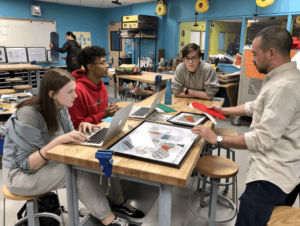No More Big Ideas? 10 Edupreneurs Suggest Otherwise
 Neil Gabler suggested in last Sunday’s NYTimes that there are no more big ideas. Compared to the big thinkers of the past, the USC prof laments “If our ideas seem smaller nowadays, it’s not because we are dumber than our forebears but because we just don’t care as much about ideas as they did.”
Neil Gabler suggested in last Sunday’s NYTimes that there are no more big ideas. Compared to the big thinkers of the past, the USC prof laments “If our ideas seem smaller nowadays, it’s not because we are dumber than our forebears but because we just don’t care as much about ideas as they did.”
He admits some big thinking has just migrated to the marketplace but dismisses the greedy bastards trying to make a buck from “intellectually challenging thoughts. About consumer electronics, Gabler says “these ideas may change the way we live, they rarely transform the way we think. They are material, not ideational.”
This article has bothered me for a week because it doesn’t reflect my experience. I have the good fortune to spend all of my time with people engaged in learning innovations. To a person (even the capitalists of the bunch) the folks I interacted with this week are committed to educational impact at scale. I appreciate that impact is different than purely intellectual pursuits, but it often incorporates big ideas and always includes a challenge to conventional wisdom.
Here’s a sample of 10 folks I talked to or talked about in the last five days:
- an audience at the PDK/Gallup announcement with big questions about what we want students to know and about inequities in this American life.
- a computer scientists devoted to building teacher capacity in K-12 and married to a scientist working on longevity and brain preservation.
- a foundation exec trying to double the number of Americans with college degrees.
- a former high tech CEO that has is committed to creating the best university in the world.
- a tech exec that moved to Africa to build a network of high performing slum schools.
- three young tech execs that sold a company and are now building an information platform that will transform college preparation.
- a video producer that has turned his attention to literacy with engaging video of young people debating great books.
- a fund manager that devotes a lot of his time and resources to developing extraordinary urban secondary schools.
- a 24 year old that wants to set the standard for how all learning content will be shared
- a former governor promoting deeper learning and gap-closing strategies
None of these folks will spend the fall reflecting at Walden Pond, but helping more young people develop the intellectual capacity to connect with the idea economy is the most important work anyone can pursue in my book. As evidenced by this list, the work of social enterprise often includes big ideas.
As Gabler suggests, it’s easy to point to signs of anti-intellectualism in American, but I am encouraged by what appears to be a growing percentage of people, particularly young people, committed to making a difference. If you want to find big ideas today, look for people committed to impact.
This blog first appeared on Huffington Post






0 Comments
Leave a Comment
Your email address will not be published. All fields are required.